You do your best to keep your body, clothes, and bedding clean – so why are you seeing yellow stains on your white sheets? This is a frustration that most people with white bedsheets deal with, all too often without a solution in sight. Even bleach doesn’t seem to make a dent in the discoloration! Why is this? Continue reading to find out.
Bedsheets turn yellow over time because of:
- Sweat
- Skin oil
- Bodily fluids
- Body lotions
- Other topical skin products
You might think that bleach will quickly and easily solve this problem, but this isn’t usually the case. Bleach can actually make staining worse because of the way it oxidizes and reacts to fluids.
So, what is a person to do when their white sheets are turning yellow? If bleach won’t work, what will? What can you do to prevent this from becoming a problem in the first place? Below, we’ll answer all of these questions so that you can keep your own sheets bright white and clean.
What Can I Do To Prevent Yellowing On My Sheets?
At this point, you may be asking yourself – how do I keep my white sheets white?
Your bedsheets absorb everything that comes into contact with them, which can result in unsightly staining. The most common culprits behind yellow stains on white sheets are skin oils, sweat, and other bodily fluids. This isn’t a reflection of how clean you and your body are; there’s no preventing your body from producing these fluids and oils. Fortunately, there are some tactics that you can use to minimize this problem.
Regular Washing
It only makes sense that the longer you let skin oils, fluids, and skin cells build up on your sheets, the dirtier the sheets will become. Far too many individuals fail to wash their bedding as regularly as they should, thinking that it’s only necessary when dirt becomes apparent or the fabric begins to smell. The truth is that it is ideal to wash your bedsheets once every week or two. Washing sheets routinely cuts down on the number of skin byproducts that are allowed to build up.
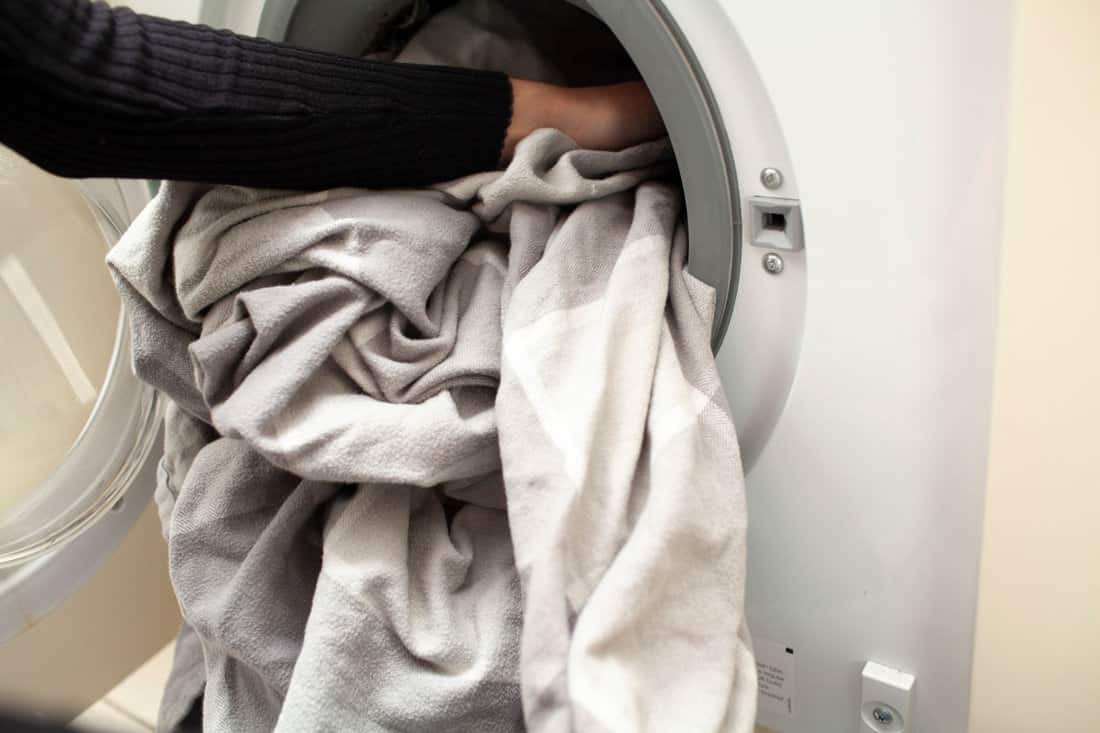
We may include affiliate links and curated AI content to highlight top design styles.
Using A Detergent Booster
Typically, washing with regular laundry detergent is enough. But if you’re really worried about buildup causing stains, you should introduce a detergent booster into your weekly washing. Borax and OxiClean are two common products that help to cut through oils and sweat left behind on bedding and all other fabrics. Use warm or hot water when washing and never put the sheets back on the bed until they are fully dry.
Click to buy OxiClean on Amazon.
Drying In The Sun
Everyone loves the fresh scent of laundry that’s been dried outside on the line. But did you know that there is another benefit to drying your sheets outside? This benefit is the lightening effect of the sun. Exposing your white bedsheets to direct sunlight can lighten up stains that are starting to form. It can even keep them from coming up in the first place!
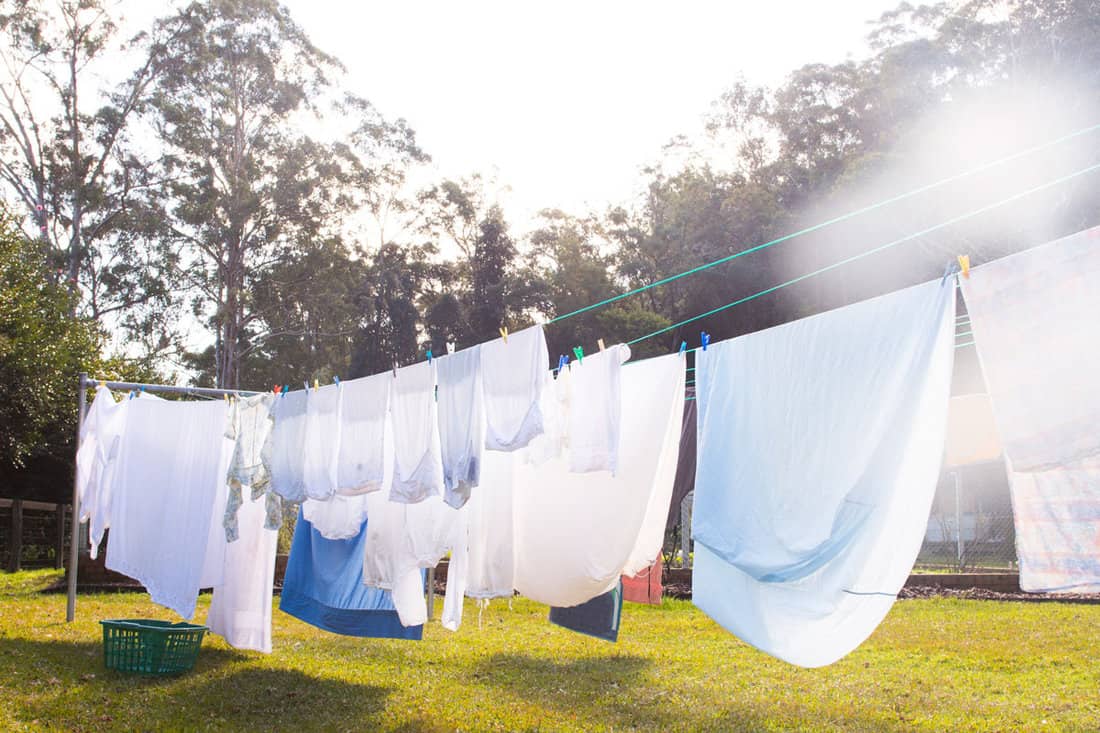
Other Tips To Keep Your Sheets White
- Only wash your bedsheets in accordance with the manufacturer’s instructions. You should be able to find this information on the tag.
- Rinse your sheets with cool water for at least 15 seconds before washing. This helps to dilute the skin byproducts that can lead to staining.
- Wash your sheets in the hottest water that’s still safe for the fabric of your bedsheets. Hot water is the most effective for a good, deep clean.
How To Get Yellow Stains Out Of White Sheets
Despite your best preventative efforts, your bedsheets might still take on an unwanted yellow hue. This isn’t to say that you’ve done anything wrong – we all know that white sheets can be difficult to keep clean. Rest assured that you don’t have to retire your favorite sheets just yet. There are some things that you can do to restore your white sheets to the crisp cleanliness that made you buy them in the first place.
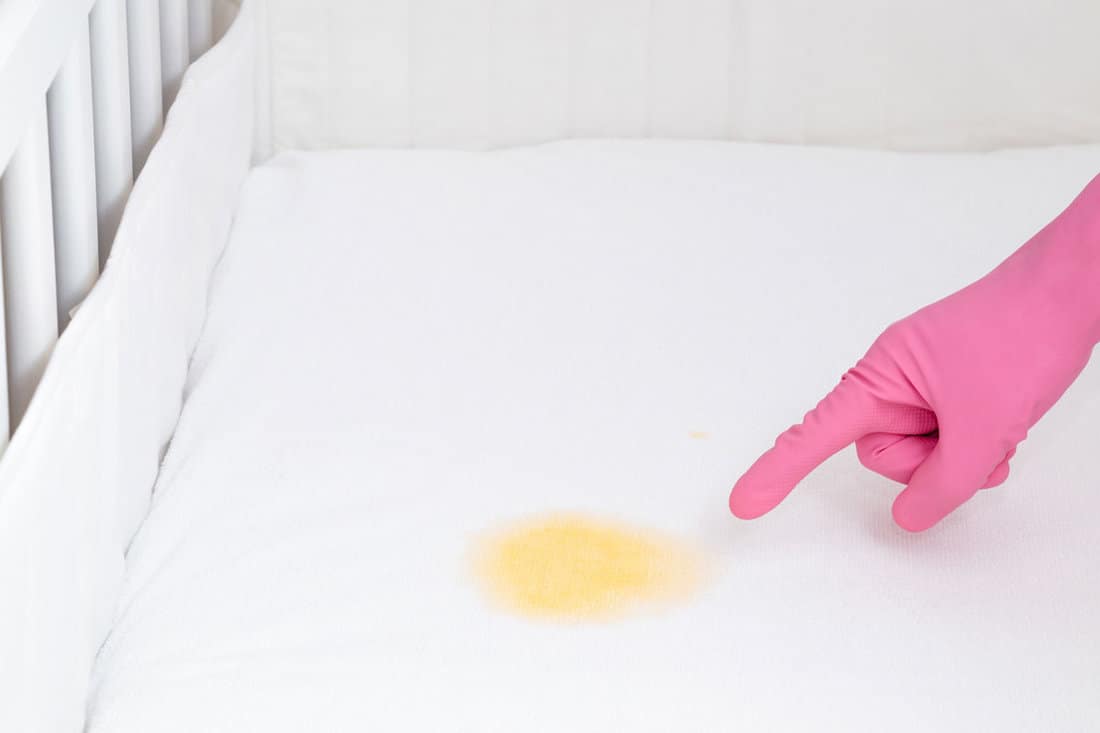
Use Natural Alternatives To Bleach And Fabric Softener
First, avoid reaching for that bleach! Yes, bleach is great for whitening many things, but yellow-stained bedsheets are not one of them. This is due to the way that bleach oxidizes and reacts with bodily fluids. Bleach can actually make stains worse. Instead, grab some baking soda and some vinegar.
A 1/2 cup of baking soda is a natural and safe alternative to bleach. You can mix it directly into your wash along with your preferred detergent. In lieu of traditional fabric softener, we recommend using a 1/2 cup of vinegar as an alternative. Vinegar is incredibly effective at cutting through oils and grease that have been trapped in the fibers of your bedsheets.
Harness The Power Of Lemons
Lemons (particularly lemon juice) are a natural bleaching agent. To get the most out of lemons as a lightening product, all you need is a pot, water, and a few lemon slices.
- Cut up a few lemons. There’s no wrong amount, so use as many lemons as you want to.
- Fill a pot with water and add the lemon slices.
- Bring the lemon and water concoction to a boil.
- Turn off the stovetop and carefully put the sheet into the water. Use tongs to avoid burning yourself!
- Soak for no less than 15 minutes.
- Wash the sheet as you normally would, in hot water with your preferred detergent and detergent booster.
As a bonus, your home will smell great and lemony fresh!
How To Remove Yellow Stains From White Cotton Sheets
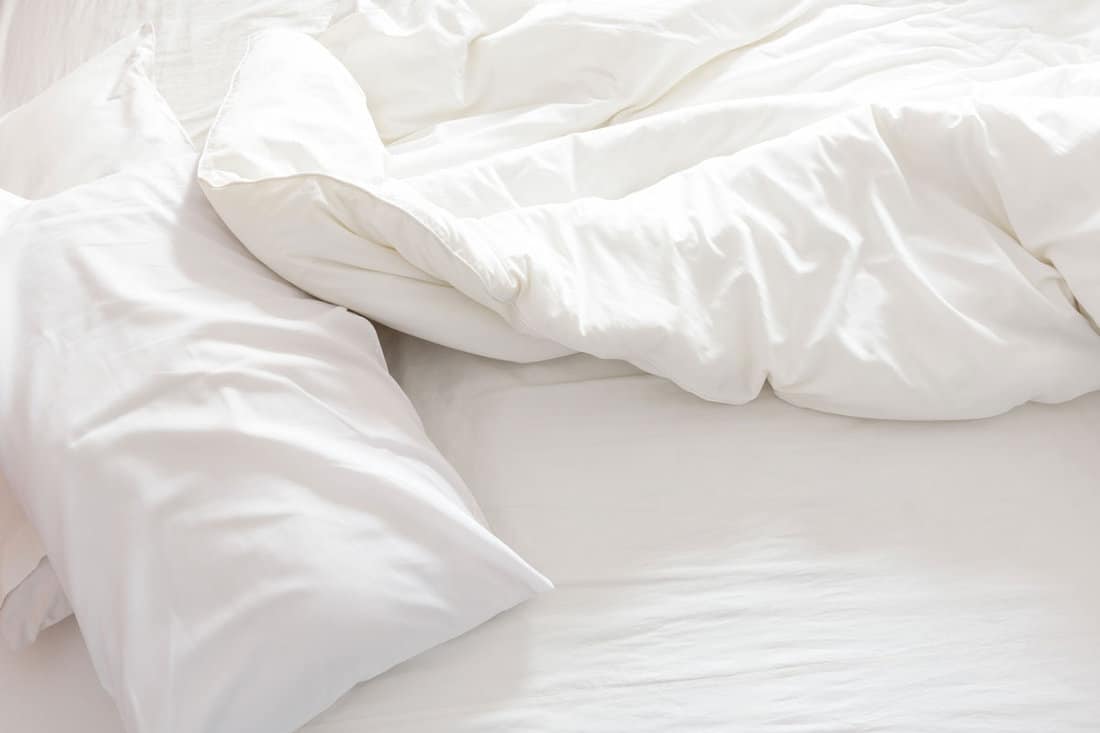
Removing Yellow Stains From White Cotton Sheets With Bleach
For 100% cotton bedsheets, bleach can be used if done so with care. For top-loading washing machines, follow these steps to use bleach in a way that won’t cause further staining on your cotton sheets.
- Fill the washing machine halfway with the hottest water that’s safe for your bedsheets.
- Add a cup of oxygen bleach to the water. Follow up with 1 cup of laundry detergent, 1 cup of powdered dishwasher detergent, and 1/2 cup of Borax or another detergent booster.
- Mix the ingredients until they are thoroughly combined in the washing machine.
- Add the sheets to the mixture and fill the washing machine the rest of the way with hot water.
- Let the washing machine perform the wash and rinse cycles as normal.
- Rinse the sheets one more time.
- Hang the sheets outside to dry, if you have access to a clothesline. Otherwise, dry in your dryer as normal.
What About Yellow-Stained Pillowcases?
Pillowcases aren’t as vulnerable to staining because it’s typically only a person’s head that rests on them – not their full body. You might be shocked to see yellow stains on your white pillowcases for this reason, but rest assured that this isn’t something bad. Your face still produces sweat and oils. You also have the added problem of saliva, which can cause staining.
The best way to combat yellow stains on your pillowcases is to get your hands on an enzymatic cleaner. An example of such cleaners are the many pet stain removers that you’ll see on the shelves at your supermarket. One great product is Nature’s Miracle, an odor and stain-busting solution that smells of citronella. Another enzymatic cleaner is the popular and effective OxiClean.
These products are a great way to spot-treat stains on smaller amounts of fabric. Simply soak the pillowcases or spray the stain and allow it to break down the oils and fluids responsible for the staining. Wash as normal, in the hottest possible water and with your preferred laundry detergent.
Yellow Stains Don’t Have To Be Permanent
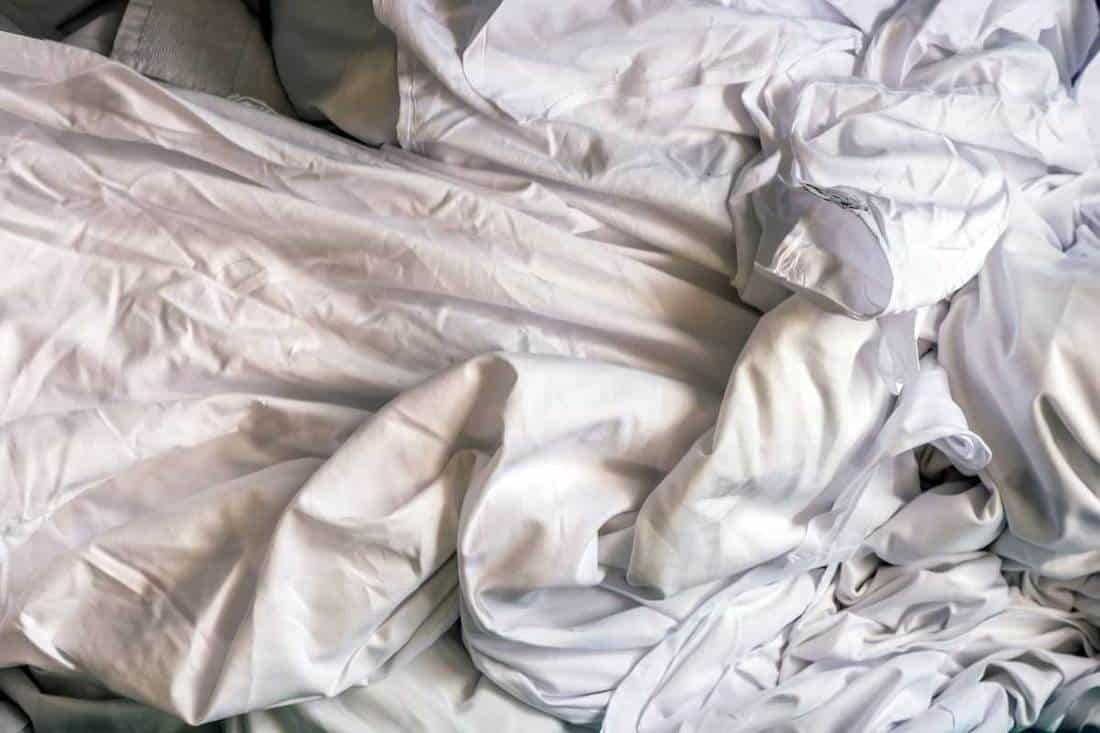
Yes, it can be difficult to get yellow stains out of white bed sheets. But as determined as these stains are to hang around, they can be made a thing of the past when you use the right products to get rid of them. Sunlight, lemons, vinegar and baking soda are all-natural and safe to use. You might even have these items already laying around your house!
If you want to make use of a storebought product, you can easily get your hands on an enzymatic cleaner like Nature’s Miracle, OxiClean or Borax. These products break down the oils and fluids responsible for stains, thus making them easier to wash away in your washing machine.
With this advice in mind, be prepared to say “goodbye” to yellow stains and “hello” to clean, white sheets!
Thinking about replacing those bedsheets? You should check out Where to buy bedsheets online? Top 40 stores, so that you can have access to the top-selling websites.

FAQs
How do you keep pillows from turning yellow?
There are a few ways to prevent pillows from turning yellow: 1. Wash your pillows regularly. Washing your pillows regularly can help prevent sweat, dirt, and oils from building up and discoloring them. 2. Use pillow protectors. Pillow protectors are used to keep dust, sweat, and oils from entering the pillow. It also helps to keep the pillow from getting dirty or stained. 3. Sunlight. Sunlight is a great natural way to help keep your pillows looking fresh. Place your pillows in the sun for a few hours a week to help prevent them from turning yellow. 4. Vacuum your pillows. Vacuuming your pillows can help remove dust and other debris that can discolor them. 5. Use a pillow freshener. Pillow fresheners are designed to help remove odors and keep your pillows smelling fresh. 6. Avoid using bleach. Bleach can discolor and damage your pillows, so it’s best to avoid using it.
Should you throw out yellow pillows?
That depends on the condition of the pillows. You don’t have to throw them out if they are still in good condition. However, if they are old, faded, or otherwise damaged, then replace them.
Can you make yellow pillows white again?
Yes, in most cases, you can make yellow pillows white again. Depending on the type of fabric the pillows are made of, you can use a bleach solution to lighten the yellow color. Alternatively, try spot-treating the pillow with a fabric whitening product, or you could take the pillow covers off and wash them in hot water with color-safe bleach.
How do you get rid of yellow stains on pillows?
To remove yellow stains from pillows, try the following methods: 1. Remove the pillow case and wash it in the washing machine. 2. Mix a solution of equal parts white vinegar and warm water. 3. Dip a cloth in the solution and blot the stained area. 4. Rinse the cloth and repeat until the stain is gone. 5. Allow the pillow to air dry. 6. If the stain persists, mix a solution of 1/4 cup of chlorine bleach and 1 gallon of warm water. 7. Dip a cloth in the solution and blot the stained area. 8. Rinse the cloth and repeat until the stain is gone. 9. Allow the pillow to air dry.
